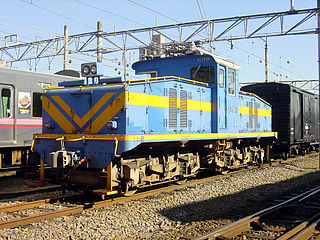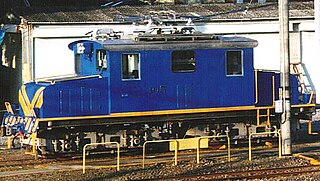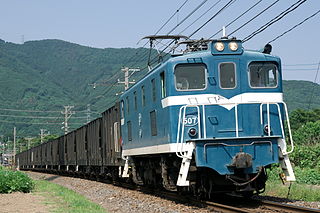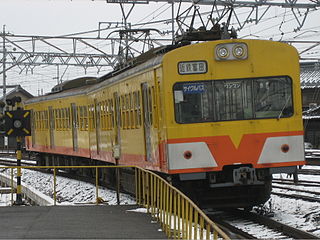
Tobu Railway Co., Ltd. is a Japanese commuter railway company in the Greater Tokyo Area as well as an intercity and regional operator in the Kantō region. Excluding the Japan Railways Group companies, Tobu's 463.3 km rail system is the second longest in Japan after Kintetsu. It serves large portions of Saitama Prefecture, Gunma Prefecture and Tochigi Prefecture, as well as northern Tokyo and western Chiba Prefecture.

The Chichibu Main Line is a railway line in Japan, owned by the private railway operator Chichibu Railway, linking Hanyū and Mitsumineguchi, both in Saitama Prefecture.

The Jōhoku Line is a Japanese commuter rail line between Kachigawa Station in Kasugai and Biwajima Station in Kiyosu in Aichi Prefecture. Trains are operated by Tokai Transport Service Company, or TKJ in short, while its rail facilities belong to Central Japan Railway Company. TKJ, a wholly owned subsidiary of JR Central, operates this line.

The Joshin Line is a Japanese railway line in Gunma Prefecture, between Takasaki Station in Takasaki and Shimonita Station in Shimonita, operated by the private railway operator Joshin Electric Railway. This is the only line operated by the company, although it also operates a few bus lines. The first section of the line opened in 1897.

The Minato Line is a 14.3 km Japanese railway line operated by the third-sector railway operator Hitachinaka Seaside Railway between Katsuta and Ajigaura, all within Hitachinaka, Ibaraki. It is the only railway line operated by the Hitachinaka Seaside Railway. The line was formerly operated by Ibaraki Kōtsū until 2008.

Mitsumineguchi Station is a railway station on the Chichibu Main Line in Chichibu, Saitama, Japan, operated by the private railway operator Chichibu Railway.

The Class EF510 (EF510形) is a Bo-Bo-Bo wheel arrangement multi-voltage AC/DC electric locomotive type operated by JR Freight and East Japan Railway Company in Japan since 2002. As of 1 April 2016, the fleet consists of 38 locomotives, all based at Toyama Depot.

The Class EF66 (EF66形) is a six-axle, three-bogied (Bo′Bo′Bo′) DC electric locomotive designed for fast freight used by Japanese National Railways (JNR) and later operated by its descendents JR West and JR Freight. As of 1 April 2016, 39 locomotives remained in service, all operated by JR Freight.

The Kashima Rinkai Railway Ōarai Kashima Line is a 53.0 km Japanese railway line in Ibaraki Prefecture, which connects Mito Station in Mito with Kashima Soccer Stadium Station in Kashima. It is owned and run by the third-sector railway operating company Kashima Rinkai Railway (KRT).

The Chichibu Railway 7500 series (秩父鉄道7500系) is an electric multiple unit (EMU) train type for Chichibu Main Line local services on the Chichibu Main Line operated by the private railway operator Chichibu Railway in Japan since March 2010.

The Chichibu Railway 1000 series (秩父鉄道1000系) was an electric multiple unit (EMU) train type for local services operated by Chichibu Railway in Japan from 1986 until March 2014.

The Chichibu Railway 6000 series (秩父鉄道6000系) is an electric multiple unit (EMU) train type for express services on the Chichibu Main Line operated by the private railway operator Chichibu Railway in Japan since 2006.

The Meitetsu DeKi 600 was a Bo-Bo wheel arrangement electric locomotive type operated by private railway operator Nagoya Railroad (Meitetsu) in Japan from 1943 until 2015.

The Meitetsu DeKi 400 was a Bo-Bo wheel arrangement electric locomotive type operated by private railway operator Nagoya Railroad (Meitetsu) in Japan.

The Meitetsu DeKi 300 is a Bo-Bo wheel arrangement electric locomotive type operated by private railway operator Nagoya Railroad (Meitetsu) in Japan. The locomotives were used primarily on track maintenance trains, but following their withdrawal in 2014, only one locomotive, DeKi 303, remains in use, limited to depot shunting duties at Meitetsu's Maigi Maintenance Depot.

The Chichibu Railway 7800 series (秩父鉄道7800系) is a 2-car electric multiple unit (EMU) train type operated by the Japanese private railway operator Chichibu Railway on Chichibu Main Line local services since 16 March 2013.

The Chichibu Railway Class DeKi 300 (秩父鉄道デキ300形) is a Bo-Bo wheel arrangement DC electric locomotive type operated by the private railway operator Chichibu Railway in Saitama Prefecture, Japan, primarily on freight services, since 1967.

The Chichibu Railway Class DeKi 500 (秩父鉄道デキ500形) is a Bo-Bo wheel arrangement DC electric locomotive type operated by the private railway operator Chichibu Railway in Saitama Prefecture, Japan, primarily on freight services, since 1973.

























